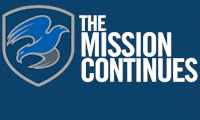We Stand Together: Recognizing Our Mental Health
May 6, 2022

As we recognize Mental Health Awareness Month throughout the month of May, we know – perhaps now more than ever – that there are very real challenges affecting our veterans. We are spotlighting veterans who exemplify connectedness, purpose, and growth as key factors in seeking their mental health support, and we’re happy to share their stories with you here.
—
When Andi Ward got out of the Navy, she did her best to stay far away from the veteran community. Andi deployed to Ramadi, Iraq, in 2008 and to Djibouti and Uganda, Africa, in 2009 before leaving the military abruptly. While combat related PTSD has become increasingly recognized, veterans are also at unique risk of transition stress. Transition stress encompasses numerous issues facing transitioning military veterans, such as loss of purpose and sense of identity, difficulties securing employment, conflicted relationships with family and friends, and other general challenges adapting to post-military life.
“It took me five years to reconnect with other veterans and realize how valuable it is to have a community and begin healing,” said Andi. “Being around veterans and being able to get out and do service projects really fed my soul. I realized that I have to do things in life that bring that camaraderie back and make me really happy.”
Earlier this year, in our annual survey, our veteran network shared insights regarding challenges they experience:
- 31% have screened positive for PTSD or trauma-related problems
- 40% have screened positive for depression
- 17% have either been diagnosed with or treated for traumatic brain injury
- 25% have experienced military sexual trauma
- Nearly one quarter of respondents indicated they are at risk of using alcohol as a coping mechanism
- 29% shared they needed mental health treatment or counseling but did not receive it within the past year
- 62% shared they do not feel loved, which indicates a risk of social isolation and that they lack a support network
- A majority of veteran respondents said their mental health is less than good (57%)
- A majority said they do not have a sense of purpose (58%)
Listening to our veterans’ stories of courage and perseverance deepens our commitment to helping more veterans grow and connect with others. Through our Service Projects and professional leadership programs like the Women Veterans Leadership Program and Service Leadership Corps, we increase a critical protective factor: providing opportunities to pursue healthy problem-solving or coping skills by ensuring our veterans have safe environments to learn new hard and soft skills. Those highly sought-after soft skills that veterans hone throughout their military career – leadership, discipline, loyalty and drive – would go unnoticed and buried under past and active struggles with depression, anxiety and PTSD.
For many veterans, mental health still carries a stigma of being ‘weak’ and many of our VSO partners say this stigma, coupled with fear of being perceived as ineffective, can sometimes make it even harder to admit when they need help.
For Army veteran Derek Auguste, serving in the military meant that his life had a purpose. When he left the Army, Derek faced one of the greatest personal challenges. “For me, not knowing how to communicate I was missing a sense of purpose left me feeling empty and I had a void that I didn’t know how to feel,” said Derek, who served as the Platoon Leader for the Miami area and now serves as an Alumni Leader. “That’s when I found The Mission Continues, and it offered me a platform to feel that sense of purpose again.”
Moving Forward
We’ve been listening closely to what our veterans and volunteer community have been telling us about the connectedness they feel at our service projects and how it helps to reduce the risk factor of social isolation. In the coming years, we will continue to use evidence-based methods and processes to connect more veterans to veterans and non-veterans, and to increase their sense of purpose. Our approach is making a difference:
- Of veterans who responded to our most recent annual survey, nearly all who engaged with us at least once in the past two years feel more connected to other veterans (79%), compared to veterans who did not recently engage with us. And 80% believe in their ability to make a difference in their community.
- 79% of our current Women Veterans Leadership Program participants chose The Mission Continues to develop deeper connections with other women.
- 100% of our most recent Service Leadership Corps graduates indicate a greater sense of purpose, and feel they are a part of something larger than themselves with The Mission Continues.
- 91% of our platoon leadership team members in our Service Platoon Program feel a greater sense of purpose because of their service with The Mission Continues.
Our goal as an organization is to be a part of the overall system of care for this country’s veterans. With our partners, we will help improve veteran mental health outcomes and their ability to live up to their tremendous potential as leaders. While we are making a positive impact on the lives of veterans across the country, our work is not done.
—
We stand in solidarity with our veterans who are experiencing mental health challenges and with our VSO partners who work tirelessly to provide the support they need. So if you are a veteran, or know a veteran, in need of more support, please visit veterancheckin.org or call the Veterans Crisis Line (1-800-273-8255). You can learn more about our programs on our website and stay updated on the latest news and announcements on Facebook and Twitter
 You are successfully logged in.
You are successfully logged in.





